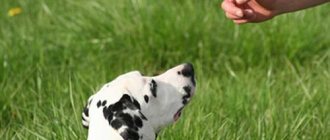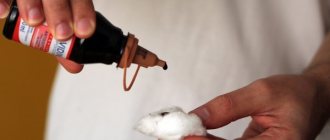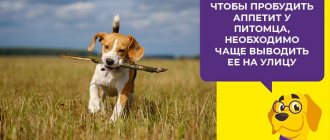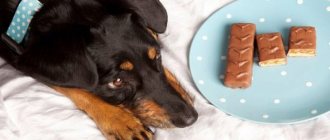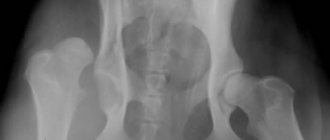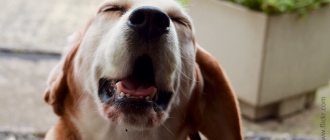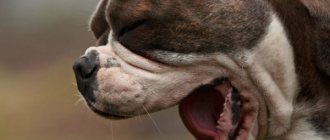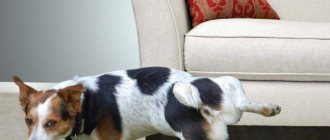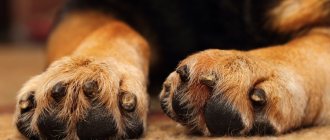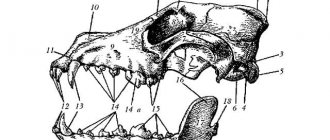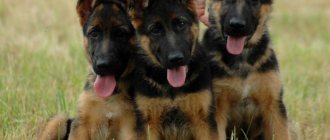The owner who has wondered why the dog eats its own feces and what to do about it is not alone. Most often, females of small breeds are engaged in eating excrement. This unpleasant tendency is called coprophagia and is not a disease. Despite this, it can and should be fought, since such a “hobby” can lead to very bad consequences.
Why is coprophagia dangerous in dogs?
Dogs eating feces is a dangerous habit that can lead to infection. The excrement of other animals can contain parasites, viruses and bacteria, so your pet is at risk of contracting the following diseases:
- Parvovirus enteritis
. This pathology is most severe in puppies. As a result of severe diarrhea and constant vomiting, severe dehydration develops, depleting the body.
- Toxoplasmosis
. This disease is equally dangerous for four-legged friends and their owners. Toxoplasma causes a severe blow to the immune system, so it is not always amenable to drug therapy in elderly pets.
- Helminthiasis
. A large ball of helminths is fraught with blockage and rupture of the intestines with subsequent release of the contents into the body. Severe intoxication is fatal.
- Leptospirosis
. The main symptom of Leptospira infection is jaundice. These parasites infect liver cells, causing irreversible pathological changes. Elderly dogs and puppies left without treatment die within the first day.
If you catch your four-legged friend eating other people's feces, try to find out the reason for his perverted preferences. This will help deal with the problem in the future.
Why is eating feces dangerous for a puppy?
Why is eating feces dangerous for a puppy? Intuitively, every owner knows that when a puppy eats its own or someone else's excrement, it is in danger, but what exactly is the threat?
Obviously, when eating feces, a puppy can become infected with worms, and of a wide variety of types. Most intestinal parasites have a simple development path. The adult lays eggs, they are released into the external environment with feces and are swallowed by future carriers.
In addition to worms, which are relatively easy to eliminate, by eating feces, a puppy can become infected with a variety of viral diseases. Parvovirus enteritis is considered a common viral disease that enters the external environment with waste products. There is a vaccine against this virus, but if you still come into direct contact with infected excrement, he will still get sick.
Parvovirus enteritis is characterized by rapid and acute development of the clinical picture. Literally a few days after infection, the puppy will begin to have severe diarrhea and vomiting. Constant irritation of the intestinal mucous membranes will lead to their death, which can lead to the death of the puppy if he does not receive qualified assistance. Moreover, even with high-quality and timely treatment, with a low level of immunity, there is a very high probability of the puppy’s death.
Causes of coprophagia in dogs and puppies
For wild dogs, eating feces was an effective way of protecting themselves from predators. Females eating the feces of their puppies destroyed the odorous trail, confusing their pursuers. After domestication, the problem disappeared, and such behavior became unjustified and dangerous.
If a dog eats its own feces, then the reason for its behavior can be explained from a physiological or psychological point of view. Depending on the provoking factor, a veterinarian or animal psychologist may be needed for treatment.
Physiological
Most physiological causes are associated with disorders within the body. These include:
- Parasitosis. Infection with helminths often leads to a perversion of appetite. In addition to excrement, the patient may eat stones, soil and other inedible objects.
- Hunger. If there are long breaks between feedings, the animal may try to kill the worm in any available way.
- Syndrome of impaired absorption in the intestine. This pathology is accompanied by increased gas formation, foul-smelling stools, diarrhea and anemia.
- Hidden infections and gastrointestinal diseases. For this reason, your four-legged pet should first be checked by a veterinarian. Otherwise, weaning from an unpleasant habit may fail.
- Lack of digestive enzymes, vitamins and microelements. The excrement contains beneficial bacteria, so the pet simply replenishes its meager reserves.
If the animal is healthy and well-fed, then the answer will have to be sought in psychology. In the life of a four-legged friend, the attention of the owner plays a huge role, therefore, in its absence, the occurrence of coprophagia is the smallest possible problem.
Psychological
Psychological reasons are directly related to emotions and behavioral characteristics. These include:
- Jealousy
. If a dog is jealous of other pets, he may eat their feces to clear the area of foreign odors.
- Imitation
. After giving birth, the mother is responsible for the hygiene of her babies for a long time. If a puppy eats its own feces, it is simply imitating a more experienced animal.
- Dominant behavior
. Animals that constantly demonstrate their strength and superiority can force other four-legged animals to eat their excrement. Similar behavior from weaker dogs confirms the recognition of the leader.
- Curiosity
. Puppies learn about the world using all their senses. Sometimes they taste completely unexpected things.
- Prolonged stress
. Rare walks are fraught with incontinence. If the owner punishes for leaving piles, then over time the dog will begin to hide the “evidence”.
- Lack of attention
. A pet deprived of the owner’s attention will definitely try to attract him in any possible way. He may begin to damage furniture or bark loudly, disturbing neighbors.
- Competition for food
. A large number of domestic animals is fraught with periodic or constant taking of food. As a result, the dog swallows any stray piece without thinking about the nature of its origin.
Another possible reason is taste preferences. Some four-legged pets are crazy about the excrement of animals of other species, which leads to interspecific coprophagy.
Causes
Before scolding a dog for catching and eating a poop while walking, it’s worth figuring out why he did this. Perhaps by eliminating the cause of such cravings, you can get rid of the habit itself.
Veterinarians identify the most common reasons for this behavior:
- Imitating mothers . From birth, puppies watch the bitch clean up litter after litter and sometimes learn this from her. A bad habit is formed from childhood and lasts throughout life. If the breeder does not correct the incorrect behavior in time, the future owner will have a hard time. The most effective way in such a situation is to form the correct chain of actions that diverts attention from feces. During a walk, immediately after bowel movement, call your dog and give him something tasty. Gradually, approaching you for encouragement will become a natural course of action.
- Dietary habits are the main cause of coprophagia in the wild, so domesticated representatives of the canine species are trying to adjust their diet with the help of an urban manure substitute. In this case, only a complete review of your diet, taking into account the advice of a good nutritionist, will help you get rid of the habit. A muzzle will help restrain the urge to eat the digestive waste of other creatures.
- Fear and lack of self-confidence are a common reason for the destruction of waste for apartment neighbors. Most often this turns out to be the contents of the cat's litter box. The dog behaves this way because feces are also a mark. Accordingly, he tries to get rid of them, either to demonstrate that this territory is occupied and another animal should not feel in charge, or to disguise the traces of the “pack” so that stronger opponents do not invade them. Sometimes a dog is forced to eat its own poop by a feeling of fear of the owner, who scolds him for leaving piles in the wrong places. In this case, reducing mental tension by increasing communication and taking sedatives will help suppress the habit.
- Feeling of uselessness and abandonment . Conspicuous eating of feces is often the result of an attempt to attract attention. Dogs are social animals; they need to feel included, needed, loved. If an animal does not have enough attention from its owner, it will try to achieve a reaction by any means. If the owner reacts to an attempt to eat feces at least once, the dog will do it again and again to cause the desired reaction.
Why does a dog eat more than just its own poop?
If a dog eats cat feces, it is likely suffering from nutritional deficiencies. Cat feces are enriched with proteins and microelements, so four-legged pets equate it to a real delicacy.
The excrement of herbivores, containing large amounts of fiber, is no less nutritious. Therefore, in rural conditions, you can often see a dog looking for “tidbits” in horse or cow manure.
From a psychological point of view, coprophagia can be explained by a developed territorial instinct, dominant behavior or jealousy. By getting rid of feces, the dog eliminates traces of a competitor or tries to attract the attention of the owner.
The dog eats its own poop
There are a number of factors that contribute to this behavioral problem.
Coprophagia (eating feces) is considered quite common among dogs. Moreover, in most cases, experts consider this behavior of dogs to be normal and natural , no matter how disgusting it may look from the outside.
If a nursing mother diligently eats the babies' excrement in the first month of life, this is considered to be the norm. When a small puppy who is just learning to explore the world around him accidentally eats his own feces, there is no reason to worry.
But frequent cases of coprophagia in four-legged pets without apparent motives may indicate symptoms such as a lack of vitamins in the pet’s body or fear of punishment.
Reasons for puppies eating feces
Puppies often simply imitate the behavior of their mother dog.
- The baby, watching his mother do this, begins to imitate her.
- The puppy thus studies an “object” unfamiliar to him by smell and taste.
- The feces could remind the puppy of his first solid food, which his mother chewed or regurgitated for him.
- The kid was punished for “piling” in the wrong place and he is trying to hide the traces of the crime.
Causes of caprophagia in adult dogs
Maybe your dog lacks communication?
- The pet’s body lacks vitamins (in particular protein).
- There are not enough enzymes in the dog’s digestive system to help digest food.
- The dog lacks communication and attention from the owner.
- The four-legged pet is afraid of loneliness.
- The dog imitates the owner, watching how he cleans up his excrement.
- The basis for coprophagia may also be a memory from those times when the ancestors of dogs ate carrion, and foul-smelling feces remind animals of the smell of a decomposing corpse.
Before you wean your pet from this habit, you should visit a veterinarian and make sure that he is absolutely healthy.
How to stop a dog from eating feces: 6 methods
There is no single method that is suitable in all situations. You will have to deal with the situation through trial and error, based on the characteristics of your pet.
Behavior adjustment
It is better to discuss strained relationships between pets with an animal psychologist. You can help yourself only with enough food and daily monitoring during feeding. This will prevent theft from someone else's feeder.
Try to devote more time to your pet. Even a lap dog needs outdoor play. Do not limit communication to stroking and rare trips outside. Try signing up for agility - this sports discipline will bring you closer and make up for the lack of activity.
If you are very busy at work, you can keep your bored pet occupied with interactive toys. Some owners recommend leaving their pets with the TV on.
Start learning the prohibition commands. Using "ugh" and "don't" can easily prevent you from picking up questionable items while walking. At first, distract your pet with a toy and reward him with a treat. The easiest way is to entrust the learning process to a professional dog handler by enrolling in OKD or UGS courses.
Review of diet and vitamin supplements
If your dog eats feces, find out what it is missing. A lack of vitamins during dry feeding is only possible when using cheap economy-class feed. The raw materials of the lowest quality are used in their production. The composition of such feeds is not balanced. Plant components predominate over meat ones, and animal protein is the main source of nutrition for predators.
With natural feeding, vitamin supplementation is a prerequisite for creating a balanced diet. Get tested to understand what substances your pet needs. Based on the test results and medical history, the veterinarian will be able to select a specific drug.
Timely removal of feces
The best way to combat coprophagia is to eliminate provoking factors. Clean up after your pet while out on walks using bags. This helps clean the city and eliminates the possibility of eating fresh feces, which are of much more interest to animals than dried feces.
If a similar situation occurs at home, but the object of unhealthy love turns out to be cat feces, cut off access to it. Close the door to the toilet or other place where the tray is located tightly, not forgetting to make an opening for the cat.
If there are several coprophages, temporarily distribute them in different rooms. This will prevent repetition one after another while correcting behavior.
It will be more difficult with mother-fed puppies. They cannot be separated until the end of feeding, so only timely removal of feces will help here.
Using a muzzle while walking
Always keep your pet on a leash when other people and animals are around you. This is not only good form, but also an excellent way to stop unwanted actions.
Also, do not forget about the muzzle. Representatives of large breeds are difficult to keep even on a leash. Especially if your child goes for a walk with the dog. Buying a muzzle will simplify walking, eliminating the need for constant monitoring.
Screening for diseases
Sign up for an examination at a veterinary clinic to identify possible hidden pathologies or confirm your concerns if you have alarming symptoms. If an illness is detected, the perverted appetite will disappear on its own after recovery.
Use of special drugs
Eating of feces by dogs is prevented not only by taking vitamin and mineral complexes, but also by special preparations that change the taste of feces. They are divided into 2 types. The former are given to the coprophages themselves, and the latter to the animals whose excrement they consume. In addition to creating a bitter taste, the first type of drug helps to compensate for the lack of enzymes inside the body.
If the problem occurs on the street, then it is better to use spray medications. They are sprayed onto any excrement that interests the dog. Once convinced that it is inedible, he quickly loses interest.
How to stop a dog from picking up everything
So, let's look at what measures need to be taken to independently solve the problem associated with your dog eating poop:
- First of all, exclude the very possibility of four-legged animals eating their own or other people’s piles. Keep your house clean and remove your pet's waste on time. If your tail is “walking itself” in a country house, then the piles should be removed on the site itself.
- If your pet is forced to be alone for a long time, provide him with enough toys and treats so that he has something to do alone without turning his attention to poop out of boredom.
- Never punish an animal for puddles or piles of poop if he made them in the apartment. Physical punishment is not only useless, but also completely ineffective.
- Never yell at your pet, much less poke your nose into a pile or puddle. This can lead not only to loss of smell (and this is the dog’s most important organ of communication with the outside world), but also to misunderstanding. Punishment often does not do any good, but on the contrary, it frightens the dog, forcing it to get rid of its feces by eating it so that the owner does not scold him.
- If you catch a dog eating feces, then under no circumstances chase or coax it. If your dog eats poop right in front of you, here's what you need to do. Clap your hands loudly, shout a prohibiting command, throw a leash, a bunch of keys (but not at the dog). When your pet unexpectedly “breaks away” from what he’s doing, call him over, force him to carry out some command, and after executing it, praise him and give him a treat.
- Give your dog more exercise both at home and outside. Play with your dog, learn commands, do exercises, teach your pet to carry a toy in its teeth. Do not give the animal time or reason to sniff out poop. By the way, read about what to do with your four-legged pet.
- Teach your tailed obedience. Learn the prohibiting command “Fu!” As soon as the dog becomes interested in the “find,” strictly say “Ugh!” and pull the leash. Repeat the exercise as often as possible. Even if the dog quickly learns the lesson, never lose attention or lose patience. If you are consistent and persistent in the learning process, then the command should work immediately. Read about basic obedience skills, the very first and most important commands in the life of a four-legged animal.
- Do not forget to praise the animal at the first positive result, give it a treat. The dog should feel loved and needed.
- Put a muzzle on your tailed dog. Choose a model that does not give him the opportunity to pick up something from the ground, but does not interfere with normal breathing.
Just because your dog eats poop doesn't mean it's a bad dog. The thing is that our furry creatures, wanting to explore the world around them, begin to taste and taste everything. The dog is not to blame, he obeys natural instincts. And our task is to wean him from this habit in order to preserve the health of your beloved pet.
I hope that all the methods I have suggested will help your prankster get rid of this bad habit. I just want to note that you should not resort to one specific method, but use them all at once.
To make your pet happy, you need to exercise, play with him, and devote as much time as possible to him. Know that in most cases, a dog eats poop because he simply has nothing to do with himself.
What mistakes should you not make?
The main mistake that coprophagous owners make is the use of screams and physical force as punishment. Such actions do not help, but only worsen the existing picture. A frightened animal perceives the process of defecation as something forbidden, so it begins to destroy “evidence” furtively.
If there are psychological problems associated with lack of attention, any reaction will be perceived by the pet as approval. In such a situation, it is better to use ignoring. Avoid hugging and licking for the time being. If your pet cannot bear it because of your prolonged absence, silently take him for a walk and be sure to praise him after relieving himself.
Sometimes dealing with coprophagia is difficult and long, but it is quite possible. During training, maintain composure and try to avoid common mistakes. In most cases, the culprit of the problem turns out to be a disease or the owner himself, so feel free to go to the veterinarian and think about the warmth of your relationship with your four-legged friend.
The article is for informational purposes only. Contact your veterinarian!
Wrong diet
Poor-quality ready-made food or monotonous food leads to the fact that the dog begins to look for an additional source of protein and vitamins. And he finds them not only in his own feces, but also in the excrement of other animals.
The main reason for eating excrement is considered to be an improper diet.
For example, it is very common for dogs to eat the feces of cats that eat food containing proteins and taurine. But the problem is that taurine, which is necessary for the cat’s body, is harmful for four-legged pets . Therefore, if the dog begins to periodically “feast” on the contents of the cat’s litter box, the owner should place the box with the litter in a place inaccessible to the dog or immediately remove the furry pet’s feces.
Herbivore poop is also attractive to dogs suffering from nutritional deficiencies because it is high in protein and fiber. Sometimes dogs eat horse excrement to get rid of worms.
Therefore, if the owner notices that his pet is partial to his own or other people’s feces, then perhaps he should review the animal’s menu and make the food more nutritious and healthy.
Pay special attention to your diet.
You can include in your dog's diet:
- Sea fish.
- Offal.
- Brown bread (in limited quantities).
- Sauerkraut.
- Vitamins A, B and D.
It would be a good idea to check your dog for worms. But we should also not forget that it is necessary to regularly take preventive measures against these parasites.
Reasons for dogs to eat poop
Dogs are similar to people in some ways; they experience different experiences and emotions. Scientists have found that a pet deprived of the owner’s attention is many times more likely to eat its own feces than a dog that constantly feels affection.
But the main reason that a dog eats feces is an incorrect diet. So, for example, if we consider wild dogs, they eat manure to improve digestion. It contains a large number of microorganisms that promote rapid digestion of food. This has been the case since ancient times, this habit was passed down from the ancient ancestors of dogs and remained in modern animals at the level of instinct. In today's cities it is almost impossible to find manure, so they start eating their own or cat feces.
Nutrition and disease
The main reasons why dogs start eating their own excrement are as follows:
- Unbalanced diet. Owners feed their pets only porridge or only meat.
- Too many bones in the diet.
- The dog constantly overeats.
- Frequent feeding of various treats (from the table), which negatively affect the animal’s digestion.
- Lack of vitamins.
- Diseases of the gastrointestinal tract.
In fact, there are many reasons why a dog eats feces, but these are the most basic ones, and every owner should know about them. Experts in animal psychology believe that a dog that picks up feces with a balanced diet and, being absolutely healthy, does this on purpose in order to provoke its owner to some kind of reaction and he shows emotions. The animal simply does not have enough attention.
For this reason, it is important to find closer contact with your pet, perhaps simply increase the walking time, and spend it with physical activity.
Imitation
When the puppies are born, the mother removes traces of their activity by eating their feces. So that the brood is not discovered by predators. Young individuals notice this and begin to imitate her. The owner must not miss this moment and stop this behavior, otherwise the puppies will get used to it, and in adulthood it will be much more difficult to wean them.
Reasons for behavior
The condition, which bears the scientific name “coprophagia,” can have many different causes:
- Stress or depression due to lack of attention from the owner. A dog may experience severe shock due to a change of place of residence, the loss of an owner, illness, the appearance of a child or another animal in the house, a visit to the veterinary clinic, preparation for or presence at an exhibition, training, unexpected punishment, rudeness and much more. Most often, coprophagia is provoked by the owner himself, who screams or even raises his hand if the dog has peed or made a pile in the house (although often the reason for this behavior of the dog is precisely the person who is in no hurry to take the pet for a walk). The only way to quickly eliminate “traces of a crime” for a dog is to eat its own feces.
- All female mammals clean up after their young by licking and eating their secretions. This behavior can become ingrained if the puppy spends too much time with its mother.
- As strange as it may sound, some dogs just like to eat poop. That's it, no more, no less. Delicious, that's all!
- Distant genetic memory. No matter what your pet looks like, it is very distantly related to wolves. And they tend to “clean up” after themselves, so that the traces of physiological secretions left behind make it impossible to track the entire flock and its individual individuals.
- Rivalry. This condition manifests itself especially often when living together with other dogs. In such a “micro-pack” there is always a leader and subordinates. The weakest member of the group may demonstrate his position by eating feces.
- Competition with a cat. It’s not for nothing that they say that they live like a cat and a dog. These animals can be good neighbors, but sometimes the union results in irreconcilable contradictions. As a result of the division of territory, the struggle for power and attention of the owner, the dog can eat cat feces as a symbol of the destruction of his influence in the apartment or house. This is due to the fact that cats mark their territory, leaving traces of urine and “heaps” on its borders. Unfortunately, some dogs do the same, which can cause coprophagia.
- Sometimes the reason for eating feces is extremely banal - hunger or an acute lack of certain substances. A very hungry dog or even a well-groomed pet can do this. They instinctively feel that the body lacks certain nutrients. In the latter situation, the amazed owner can watch as the pet eats horse or cow manure. This is an alarming signal - the dog is fed monotonous, insufficiently balanced and nutritious food.
- Worm infestation. The presence of helminths in an animal’s body leads not only to coprophagia, but also to a perverted craving for inedible things. A dog can eat soil, sand, chew plaster, and chew paper.
- Sometimes the reason for eating feces is simple boredom. Left to its own devices, an animal may begin to misbehave, cause mischief, or eat its own feces.
The presence of coprophagia is always a pathology and requires rapid identification of the cause and elimination. If it takes hold and becomes a habit, it will be extremely difficult and troublesome to cope with.
